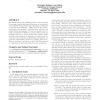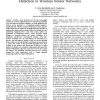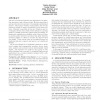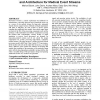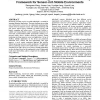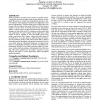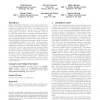136
click to vote
MOBISYS
2007
ACM
16 years 2 months ago
2007
ACM
We describe a complete hardware/software system, dubbed Universal Real-Time Navigational Assistance (URNA), which enables communication of relevant location-aware information to a...
124
Voted
MOBISYS
2007
ACM
16 years 2 months ago
2007
ACM
We identify the security challenges facing a sensor network for wireless health monitoring, and propose an architecture called "SNAP" (Sensor Network for Assessment of P...
147
Voted
MOBISYS
2007
ACM
16 years 2 months ago
2007
ACM
Wireless sensor networks have become increasingly common in everyday applications due to decreasing technology costs and improved product reliability. An ideal application for wire...
124
click to vote
MOBISYS
2007
ACM
16 years 2 months ago
2007
ACM
The area of medical monitoring and diagnostics is of particular importance and relevance today. Modern nanotechnology has reduced prices and size of increasingly sophisticated sen...
120
click to vote
MOBISYS
2007
ACM
16 years 2 months ago
2007
ACM
In response to the consistent increase of elder people living in their apartments, and the need for innovative non-obtrusive tools to connect elders to their caregivers, we starte...
112
click to vote
MOBISYS
2007
ACM
16 years 2 months ago
2007
ACM
Abstract-- Wireless sensor networks represent a key technology enabler for enhanced health care and assisted living systems. Recent standardization efforts to ensure compatibility ...
125
click to vote
MOBISYS
2007
ACM
16 years 2 months ago
2007
ACM
Provenance becomes a critical requirement for healthcare IT infrastructures, especially when pervasive biomedical sensors act as a source of raw medical streams for large-scale, a...
121
click to vote
MOBISYS
2008
ACM
16 years 2 months ago
2008
ACM
Proactively providing services to mobile individuals is essential for emerging ubiquitous applications. The major challenge in providing users with proactive services lies in cont...
137
click to vote
MOBISYS
2008
ACM
16 years 2 months ago
2008
ACM
Wireless interfaces are major power consumers on mobile systems. Considerable research has improved the energy efficiency of elongated idle periods or created more elongated idle ...
145
Voted
MOBISYS
2008
ACM
16 years 2 months ago
2008
ACM
Many people desire ubiquitous access to their personal computing environments. We present a system in which a user leverages a personal mobile device to establish trust in a publi...

